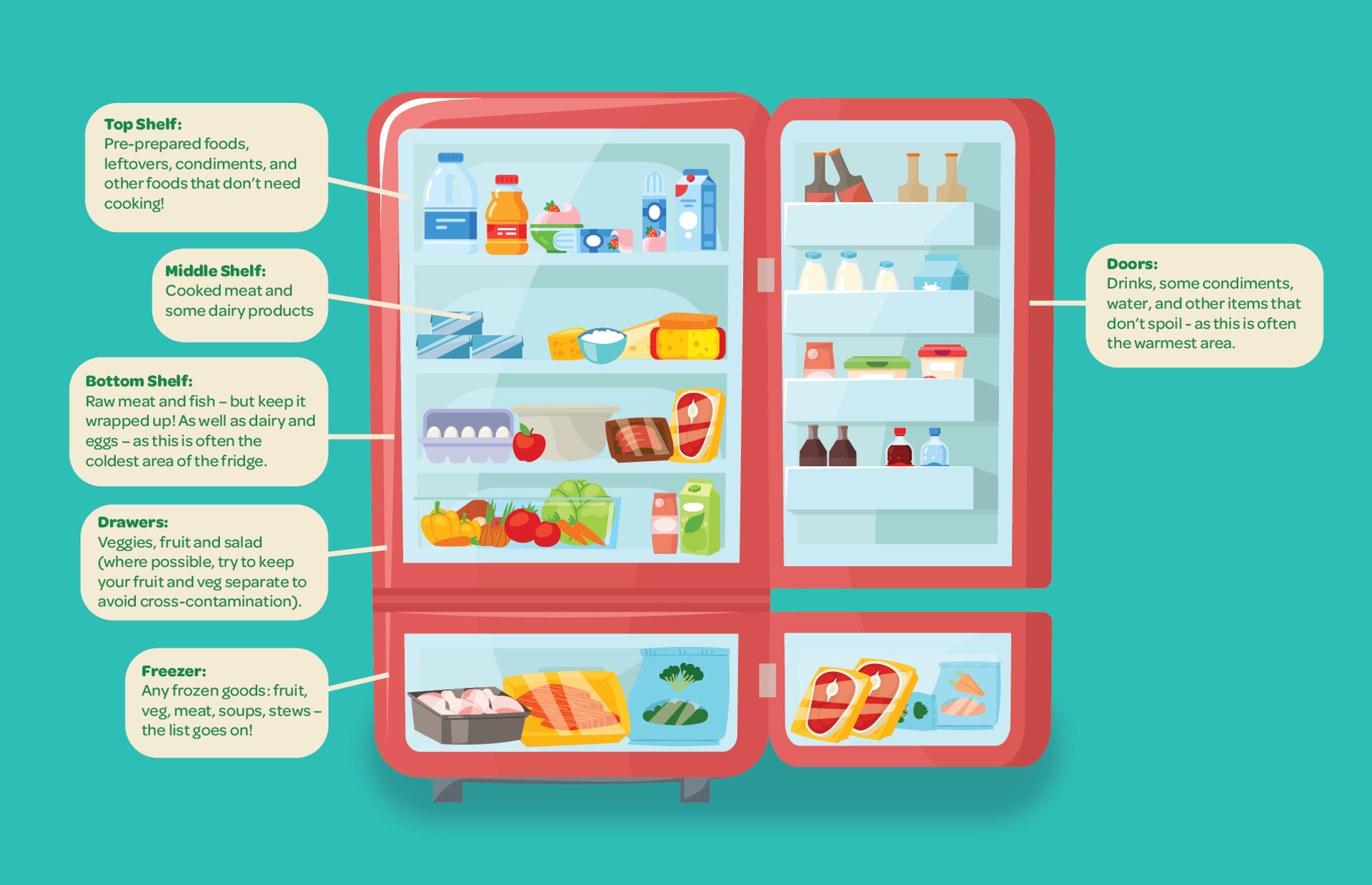
Fresh Food Storage: How to Store Food Safely
You’ve just made it home from the weekly food shop, bags in hand full of delicious fresh vegetables, ripe, juicy fruit and your selection of meat ready for the week ahead. But what’s next? The tedious task of putting it all away and finding room in the fridge and freezer…
We all have our own way of filling the dishwasher, folding our clothes, and even stocking up the fridge – but are you utilising the space properly? Can you put hot food in the fridge? And what temperature should a fridge be? Discover our guide on how to store food safely, so that your food stays fresher for longer.
Waste Not, Want Not: How to Keep Food Fresher for Longer
Fed up of opening your fridge door to find out your veg is suddenly past its best before date? You might find that because you’re shopping less, you’re wanting to know how to keep your food fresher for longer – because let’s face it, no-one likes unnecessary waste. Well, we’re here to help with our guide to fresh food storage.
Storing Food in the Fridge Freezer
Your fridge freezer isn’t just a cold cupboard in the corner of your kitchen. It’s built with several compartments that all serve different food storage purposes – that you might not be utilising properly. When storing food in the fridge, it’s important to know where it all goes, as certain areas have certain optimal temperatures. And if you’re storing things in the wrong place, you’re likely to lose out on good food and money! So the best way to keep food fresh is to learn how to store food safely and properly. Below is our guide on what to store where, and how to keep food fresher for longer.

Keeping it Cool: Top Tips for Storing Food in the Fridge
What temperature should a fridge be?
- The ideal fridge temperature for food storage is between 37°F (3°C) and 40°F (5°C)
- If your fridge drawers come with a humidity switch, keep it high for veg and low for fruit.
- Only got one fridge drawer? Keep it free for veg and move your fruit to a middle shelf.
- Don’t stack food too high as you may block the cool air from circulating.
Can you put hot food in the fridge?
- Batch cooking is a great way to use up any food before it goes off (and it helps you avoid the kitchen for the rest of the week!). But before you pop your food in the fridge or freezer, leave your extras to cool to room temperature. Otherwise, the warmth will send the temperature of your fridge and freezer into a frenzy.
- If you don’t have time to cook any meat before the best before date, then freeze it instead – as this will halt the growth of any bacteria. Once any frozen meat has been defrosted, these timelines will kick in again.
What’s the best way to keep food fresh?
- Where possible, keep your food in its original packaging as it will likely have been designed for preservation and freshness.
- Wrap your broccoli and celery in foil and it could even last up to four weeks!
- Store lettuce and leafy greens in containers with some kitchen towel to soak up any excess moisture, changing up the towel every few days.
- Keep cheese wrapped in baking paper rather than cling film, so that it can breathe.
Storing Food Safely: Things to Keep out of the Fridge Freezer
We’ve talked you through how to store food safely in the fridge freezer, but what about the fresh foods that are best kept in cool, dry places? We’ve listed a few common household ingredients with other food storage needs.
Avoid the fridge:
- Bread – it tends to go stale and dries out much more quickly. You’re better off with a bread bin!
- Whole melons – only before you’ve cut it.
- Bananas – they’re used to tropical climates, so avoid putting them in the fridge straight away.
- Tomatoes – in the fridge they’re likely to lose flavour.
- Potatoes – when stored in the fridge, the starch is converted to sugar, which is thought to be quite harmful when you come to bake or fry them.
- Onions – best stored in the pantry, cellar, basement or garage. Try storing them in an old pair of laddered tights in a cool, dark place to keep them fresher for longer. Once peeled, pop them in the fridge for up to 2 weeks.
Avoid the freezer:
- Canned food – you should never freeze canned foods directly, as the pressurised containers can cause issues.
- Raw eggs in the shells – the liquid will expand and cause the shell to crack.
- Fruit and veg with high water content – they’ll be soggy once defrosted.
- Cream-based products – they will separate once frozen.
- Fully cooked pasta – it will probably get soggy. If you’re wanting to freeze some extra portions, just make sure it’s slightly al dente.
Stocking up on fresh food with SPAR
And that’s how to store food safely to keep it fresher for longer! Eaten up all your supplies? Running low on fresh food? Head to your local SPAR for all the fresh produce you need to keep your fridge full! Always just around the corner, your friendly local convenience store is always here to help. Sign up to our E-newsletter to stay up to date with our foodie blogs, recipes and latest deals and competitions.


